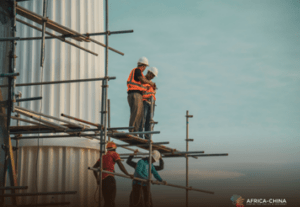By Sylvia SINKARI
Africa has increasingly emerged as a decisive ground for global economic and geopolitical competition. In recent years, there has been a noticeable decline in Western influence across the continent, leading to the rise of alternative powers, particularly China.
China’s expanding presence is significantly transforming the political and economic landscape of many African nations. Significant investments in infrastructure, including roads, railways, and energy projects, primarily drive this transformation.
Additionally, China’s approach involves deepening trade relations and fostering diplomatic ties, often through initiatives such as the Belt and Road Initiative, which aims to create a modern-day Silk Road. These efforts not only facilitate increased trade volumes but also grant China a strategic foothold in key markets and access to vital resources.
As this shift unfolds, it raises crucial questions about the long-term implications for African nations. While these developments present opportunities for economic advancement and infrastructure development, they also bring challenges related to debt sustainability, and the dependence on foreign powers. As African countries navigate this complex landscape, the balance between leveraging foreign investments and maintaining autonomy will be vital for their prospects.
A Changing Western Presence
Development aid, trade partnerships, and political cooperation have historically characterized Western engagement in Africa. However, its influence has weakened due to several factors:
- Conditional Aid: Western financial assistance is often linked to governance and economic reforms, which some African nations view as restrictive.
- Fragmented Strategy: Unlike China’s centralised approach, Western countries operate through multiple institutions, often lacking a cohesive strategy.
- Shifting Priorities: Western governments are increasingly focused on geopolitical concerns elsewhere, including Eastern Europe and the Indo-Pacific.
These shifts have created space for new actors, with China taking a leading role in filling the gap.
China’s Expanding Role:
Trade, Infrastructure, and Diplomacy
China’s engagement with Africa emphasizes extensive infrastructure development, significant financial investments, and strategic partnerships. China’s investments focus on critical sectors like energy, telecommunications, and agriculture to boost economic growth in Africa. These partnerships often include technology transfer and skills training to enhance local capacities.
- Economic Ties: China continues to be Africa’s largest trading partner, with trade exceeding $295 billion in 2024. Its focus on investment in critical sectors promotes sustainability, efficiency, and resilience against global economic challenges. Interconnecting the various sectors creates a strong foundation for future growth and development.
- Infrastructure Development: Key infrastructure projects highlight China’s focus on improving connectivity and trade in Africa. Ghana’s Tema Port expansion aims to increase container capacity for trade with neighbouring countries. In Kenya, the Standard Gauge Railway links Mombasa to Nairobi, reducing transportation time and improving freight efficiency. Additionally, Ethiopia’s Addis Ababa-Djibouti Railway connects landlocked Ethiopia to the sea, facilitating import and export trade routes. These initiatives demonstrate China’s commitment to enhancing infrastructure that fosters economic growth and regional integration in Africa.
- Debt and Financial Relations: Beijing’s approach to renegotiating or forgiving loans has strengthened its diplomatic ties with African governments amid concerns over debt sustainability. This flexibility alleviates financial pressures on these African nations and positions China as a key development partner. By prioritizing relationship-building over strict financial terms, China fosters goodwill and enhances political and economic collaboration, potentially influencing regional stability and growth.
Political and Strategic Engagement
China’s diplomatic strategy in Africa extends beyond trade and investment, underpinning its long-term partnership focus:
- Forum on China-Africa Cooperation (FOCAC): This platform facilitates agreements on trade, security, and development, reinforcing China’s strategic foothold.
- Leadership Training and Institutional Influence: China influences trade, investment regulations, and economic policies in Africa through bilateral agreements, aiming to shape governance and strengthen diplomatic relations.
Technology and Renewable Energy Partnerships
China is expanding its role in Africa’s energy and technology sectors, mainly through renewable energy investments.
- Green Energy Projects: Solar, wind, and hydroelectric power investments reflect China’s growing role in Africa’s clean energy transition.
- Technology and Digital Infrastructure: Chinese firms, like Huawei, have played a key role in expanding digital networks across Africa, raising both opportunities and concerns regarding technological reliance.
Western Countermeasures: Reactive Engagement?
In recent years, Western nations have initiated various new projects to counterbalance China’s expanding global influence. A notable example is Angola’s US-backed Lobito Corridor railway project, which aims to enhance regional connectivity and economic development.
- Delayed Response: Many Western initiatives appear reactive to China’s aggressive expansion, lacking a coherent, long-term strategy. This reactive posture can undermine the credibility of Western commitments and create perceptions of weak global leadership.
- Limited Scale: Western nations often find it difficult to compete with the scale and financial resources of Chinese-led projects. While Western investments aim to promote sustainable development and good governance, they usually lack the ambitious infrastructure and impact of China’s economic initiatives.
Navigating a Shifting Landscape
The changing geopolitical situation for African nations presents a complex mix of opportunities and challenges that require careful management.
- Economic Growth Potential: Africa’s access to diverse financing sources, such as foreign direct investment and international aid, offers significant opportunities for infrastructure development. This can drive transportation, energy, and technological advancement, essential for economic growth and improved living standards. Additionally, the rise of emerging markets and global interest in African resources could foster new trade partnerships and accelerate economic diversification.
- Strategic Considerations: African nations must tactically balance partnerships with global powers to protect their economic and political autonomy. Ensuring these collaborations do not create dependency or compromise national interests is crucial. Countries can maintain sovereignty over their resources by leveraging strategic alliances to build local capacity and attract sustainable investments. A nuanced understanding of regional dynamics and global trends is essential for making informed decisions and prioritizing long-term national goals.

Conclusion
The evolving balance of influence in Africa reflects broader global realignments. China’s engagement presents substantial economic opportunities, while Western nations strive to regain their presence and prominence on the continent. The capacity of African governments to effectively navigate these complex relationships will significantly determine the continent’s future and will influence the alignment of external partnerships with long-term development priorities.
Sylvia is a Research Fellow, Africa-China Centre for Policy and Advisory.










